First article of the 2022 and we dedicate it to Cobra Kai. The 4th season of the Netflix series, sequel of the Karate Kid trilogy, with William Zabka and Ralph Macchio, is available since 31st December 2021.
We watched it and we loved it. It is a season based on different topics, faced with a fast rhythm, which alternates moments of action with moments of nostalgia through a balanced story.
In this article, we try to analyze some of the topics of this 4th new season.
UNION AND BALANCE
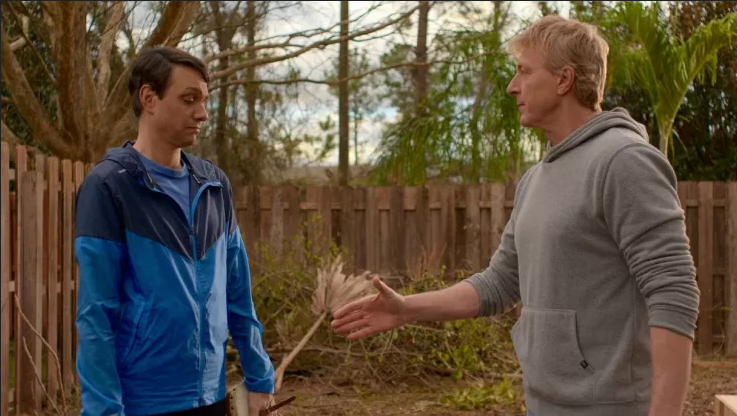
In the 4th season of Cobra Kai, Johnny and Daniel have to deal with Kreese and the Cobra Kai. In order to defeat him and his dojo, they have to collaborate.
The beginning of their collaboration is not good. The two high school rivals have different fighting styles but above all, they have different personalities and way to think.
This difference creates a lot of confusion in their students who find themselves between two fires and they often have to learn conflicting lessons.
At least at the beginning, everything seems revolve around the concept of “unity is strength”. The two sensei have to understand that in order to defeat Kreese they have to be united against a common enemy. For this reason, they have to overcome their divergences, their rivality. This is an hard task, considering that they are also very stubborn.
However, unity isn’t enough. During the episodes, another concept emerges and that is the balance. Johnny and Daniel have, not only be united, but they have to find the real balance between them.
The concept of Ying and Yang represents perfectly their situation. It is a taoist theory for which everything around us is composed by opposite forces. Only harmoniously united, these forces can favorite movement and change.
So, LaRusso and Lawrence are the Ying and Yang of one another. They are two opposite forces and they have to unite themselves harmoniously, that is they have to find balance in order to reach their goal to defeat Kreese and the Cobra Kai.
QUESTION OF STYLE
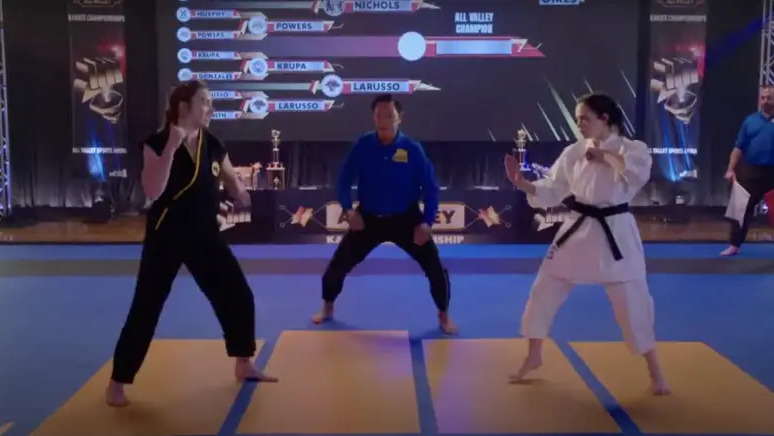
The philosophy of the Ying and Yang also helps to explain the duality in the human being.
Everybody is made of light and dark, good and bad.
“No one bad is ever truly bad and no one good is ever truly good” says Loki in the Disney tv series. We all have a dual vison of the reality, we are inclined to see it in an absolute terms. We can’t understand that good and bad, light and dark are complementary.
“Only a Sith deals in absolute” says Obi Wan Kenobi in Star Wars Episode III Revenge of the Sith but the Jedi are not so different. Maybe, if Jedi and Sith have understood this they wouldn’t have disappeared.
All of this to say that Daniel and Johnny are two faces of the same medal and everyone is persuaded that his way to do is the only correct way. The Miyagi Do teaching is based on defense. Johnny’s teaching, derived from Cobra kai, is instead based on attack. But we cannot always attack or defend and this works also outside the tatami.
In our life, we all have to deal with different situations and we can’t face them all in the same way. Sometimes we have to attack and other times we have to defend, always keeping a certain balance.
Moreover, we have to consider that everyone has a different way to face the everyday challenges. It is the result of what everyone knows, learns and lives.
Sam: I’m attacking but it’s not working. What style should I use?
Daniel: Yours. Trust your instincts.
Ep.10 s.4 Cobra Kai
Everyone has his/her own style that cannot be judged right or wrong, positive or negative and it is inside of us.
Miyagi: Just like bonsai choose own way grow because root strong, you choose own way to do karate, same reason.
Daniel: Yeah but I do it your way.
Miyagi: Hai. One day, you do own way.
Karate Kid 3
So, given that we are all a bit Miyagi Do and a bit Cobra Kai and there is no a unique way to do things, then there is no a unique point of view to see them.
Nietzsche said that the man has constantly to update his point of view and he shouldn’t focalize only on a presumed definitive truth.
It is the perspectivism for which the world can be analyzed from different point of views and everyone contributes to better understand the reality with its specific and particular approach.
DELETERIOUS EMOTIONS
The greek philosopher Seneca in his work “De Ira” said that the anger is one of the most deleterious emotions because it changes the somatic traits of the individual.
The anger, together with fear, sadness, joy and disgust, is among the primeval emotions that affects the human behavior. They are the primitive functions, enclosed in what the neurosciences call “reptilian brain”, which allowed the man to survive for million years.
Indeed, the emotions have been for a long time the main response mechanism to the dangers and the challenges. They are linked to the instinct, to the wildest and natural part of the human being. Only after million years, the man has started to use the reason and he has started to control his emotions or at least he has tried to do so.
Yes because the emotions are hard to manage. They are beyond the reason, they make you to do things that you wouldn’t do, to say things you wouldn’t say and to take decision you wouldn’t take.
It’s not a case if we say “blinded by rage” or “blinded by grief”. The emotions clouds the judgment and for this, they do not allow to see the reality as it is, they distort it.
Generally, we can do two things to manage our emotions: control them or let them control us.
COBRA KAI AND MIYAGI DO LIKE JEI AND SITH
Dimitri: I had it hard beating him when he was on the good side of the Force. Now that he’s gone all Sith, I feel like a helpless Jedi youngling about to get slaughtered.
Eli: You have the high ground. That’s how Obin Wan beat Anakin.
Cobra Kai Ep.10 s4
Who like Dimitri and Eli is a Star Wars fan has surely understood the references and has noticed that Miyagi Do and Cobra Kai are opposite like Sith and Jedi.
Cobra Kai students, like the sith apprentices, learns to how to channel their emotions and use them as a source of energy to strike first, strike hard and do not have mercy.
The emotions and the strength they can give are used and increased, above all the negative emotions like anger, hate, frustration and fear.
“Fear is the path to the dark side. Fear leads to anger. Anger leads to hate. Hate leads to suffering”
Yoda in Star Wars Episode III Revenge of the Sith
On the contrary, Miyagi Do students like the Jedi padawans, learns how to control their emotions, how to favorite the positive ones like joy, serenity, peace and altruism and how to find the right detachment
“Attachment leads to jealousy, the shadow of greed that is […] train yourself to let go”
Yoda in Star Wars Episode III Revenge of the Sith
Both the karate dojos, like both the Force orders, believe that its way to think and act is the only right way. Actually, we have talked about that in the previous paragraph, there is no a unique and right way to do things. There is no a unique way to do karate like there is no a unique way to use the Force. Everething depends on the circumstances, which take people to be more Jedi/Miyagi Do o more Sith/Cobra Kai.
What is important is to find the right balance like Grey Jedi claim. In this comparison, they are the Miyagi Fang mentioned in the conversation between sensei LaRusso and sensei Lawrence about the union of their karate schools.
Daniel: Johnny.
Johnny: What do you want?
Daniel: I want your help. Look, you and I may be set in our ways, but these kids, they’re still growing. They can learn from both of us and use what we teach them to create their own way. I guess I didn’t want that to happen because I cared so much about honoring Mr. Miyagi’s legacy. But I forgot his most important lessons. I was scared of the influence you were having on Sam but I see now, some of what you teach can be good sometimes. I’m sorry I didn’t realize that sooner.
Johnny: I’m sorry too.
Cobra Kai Ep.10 S.4
COBRA KAI LIKE DR. JEKYLL’S POTION

In the previous paragraphs, we have said that the emotions can distort the reality. They can take you to say or to do things you rationally wouldn’t say or do. Moreover, above all for what concerns the negative emotions, they can change the individual. We have said what Seneca thought about the anger, for him it was one of the most deleterious emotion from this point of view.
We have also said that the Cobra Kai, unlike the Miyagi Do, use strong emotions like anger, frustration and fear like source of strength in order to fulfill the rules of the dojo.
So, it’s clear that, following this reasoning, who joins the Cobra Kai is not the same anymore. He or she inevitably changes and we have many examples.
The first one is Eli Moskowitz, played by Jacob Bertrand. Eli is a bullied nerd teenager. He is harassed for the scar he has on his lips, a consequence of a surgery he had when he was a baby. He joins the Cobra Kai in the first season and from scared and shy boy he becomes metaphorically a hawk. Eli changes personality and look, he becomes more aggressive and bossy. He takes his revenge against who bullied him and becomes himself a bully.
He is unrecognizable to his friends, above all to his best friend Demetri. Dimitri tries to make him notice his change in behavior and he becomes an enemy when he refuses to join the dojo.
However, Eli is not the only one who changes in the Cobra Kai. Recently, in the 4th season, the Cobra Kai and its rules also affect Robbie (Tanner Buchanan).
Johnny’s son joins Kreese and his dojo after the school fight for which Robbie has been expelled and arrested and took to the reformatory where he has been bullied.
Robbie is blinded by his anger. He feels betrayed from his father who has abandoned him, from his sensei who has not believe him and form Miguel who he sees as his replacement. So he joins the Cobra Kai to take revenge against them and to vent his anger.
He reveals this to Johnny in the last episode of the 4th season after he has realized what the Cobra Kai was doing to him and his friends.
“It’s not that. It’s this kid, Kenny. I thought I could take him under my wing. Be the mentor I wish I had when I was younger. But when I saw him today, it, uh… it’s like looking in a mirror. I realized I screwed everything up. I had all this hate inside me. For you and for Miguel. And I thought I could use Cobra Kai to control that but it just made things worse and now it’s never gonna get better”
Robbie in Ep.10 S.4
Kenny (Dallas Dupree Young) is the little brother of a young prisoner who Robbie has got to know in jail. He is 13 years old and is being bullied at school. Following his brother advice, Kenny asks Robbie to help him. Robbie accepts and starts to train him to make him strong to defend himself. However, Kenny loses slowly control and from a scared little boy he become violent and aggressive.
There is no innocence in the hatefully smile he gives to his bully who is no other than Daniel’s son Antony. Antony wanted to make amend for his actions to Kenny who does not accept his excuses and starts to punch him.
Robbie stops him before he can go off limits and sees him while he pleased threatens his regretted bully. “Get ready for high school next year” he tells Antony.
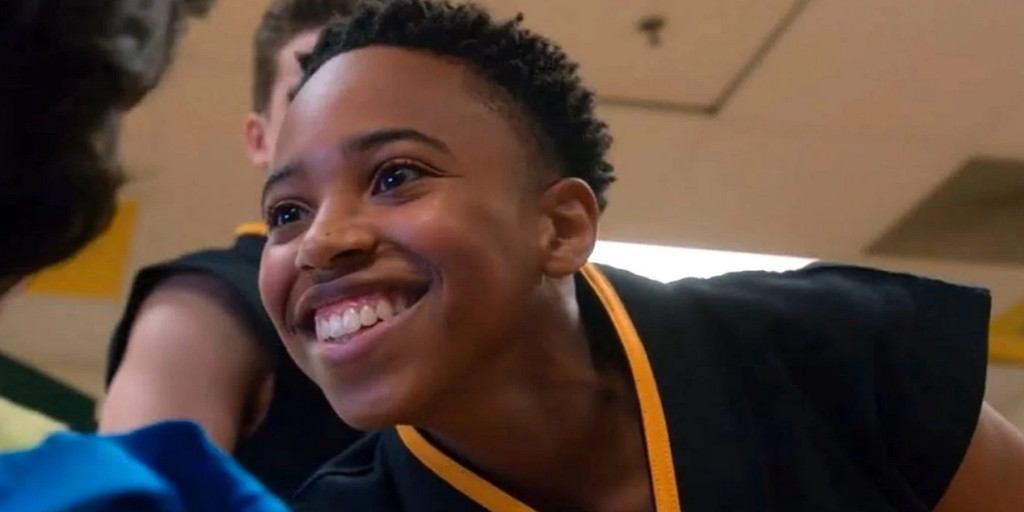
Therefore, Eli, Robbie and Kenny are some examples of how Cobra Kai can affect people. The karate dojo uses people deep desires and strong emotions and turns them in the bad version of themselves.
Its effect is similar to the Dr. Jekyll’s potion in Stevenson novel, it brings out from people what it’s hidden inside themselves.
Even Daniel has been affected by Cobra Kai, in Karate Kid 3 he briefly joined the dojo under Silver guidance. Just like Robbie and Eli, thanks to Miyagi’s help, he realized what he was doing and left it. Anyway, the experience marked him for this reason he wants strongly stop the dojo from changing the young people.
However, we have to say that Cobra Kai is not the absolute evil. We have said it before, only a sith deals in absolute. Cobra Kai teachs to strike hard, strike first and no mercy but other than that it also teaches to be strong in life, to turn our weakness in strengths. It also teaches how to study our “enemy” in order to understand how to “beat” him, in other words how to face the challenges and win.
“Know the enemy and know yourself in a hundred battles you will never be in peril”
Sun Tsu
Therefore, what Cobra Kai teaches is not completely wrong, it’s ok if you want to be stronger but this not means that if you are you have to be a “bully”. After all, as we have said previously, we can only defend; sometimes we have also to attack, always obviously as far as possible.
COBRA KAI’S EFFECT
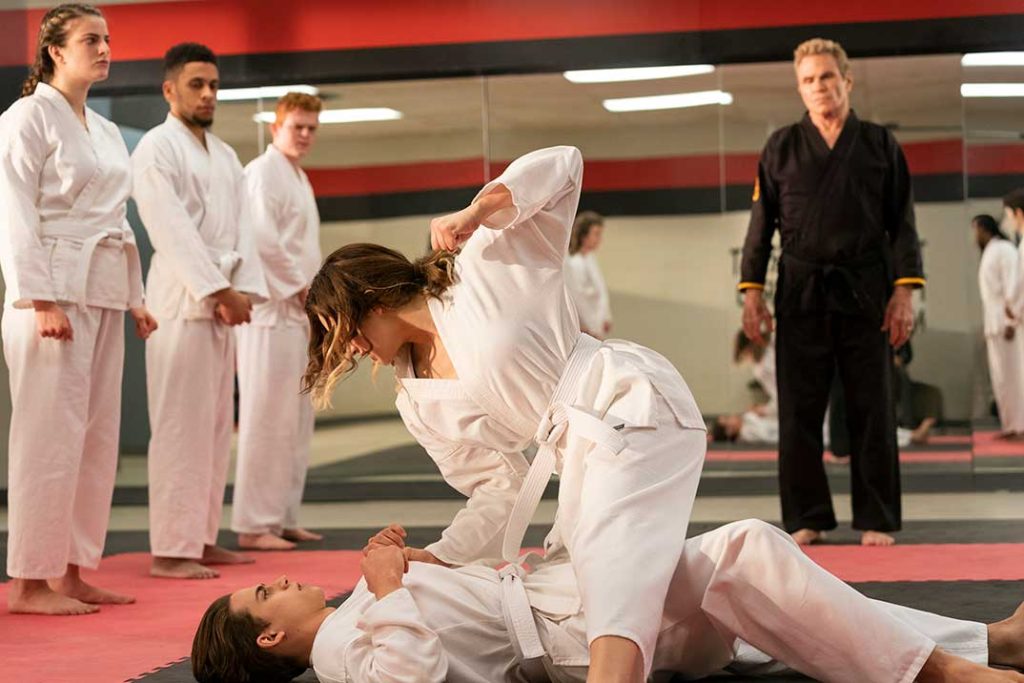
Yeah, the paragraph’s title can be misleading because we would have already discussed about how Cobra Kai can affect young people.
Actually, the paragraph’s title refers to a particular effect discussed in a previous article (here) called Lucifer Effect.
The American psychologist Philip Zimbardo studied the Lucifer Effect in 1971 with an experiment called The Stanford prison experiment.
Shortly, 24 students of the Stanford University joined voluntarily the experiment. They were divided in two groups: 12 guards and 12 prisoners, each group had specific rules to follow. The experiment’s time should have been of 14 days but after just 2 days because things got worse rapidly.
The students with the role of the guards became violent and sadist, they manage to abuse the prisoners who first tried to rebel and then, due to the abuses, started to dissociate themselves, to become passive and static. So, the experiment was interrupted after 4 days.
The result? The evil inside the human being is not natural but it derives from situational, social, environmental and psychological factors. These factors influenced the students behavior who, from a certain point of view, forgot who they really were.
Zimbardo theorized that the anonymity, the diffuse responsibility and the group size caused a process of identity and self-awareness loss. In other words, the participants lost their singular and personal identities, assuming that of a group, anonymous and loyal. This was called the Lucifer Effect.
Many other experiment led to similar conclusions during the years like the experiment of the artist Marina Abramovich in 1974.
But how Cobra Kai is involved in that? The personality change of who joins the dojo derives not only from the emotions, like we have said before, but also from the interlacement of social, psychological and personal issues. Both the University and the karate students have their own stories.
There is who have familiar problems like Kenny and Tory. Kenny’s brother is in jail, his parents are divorced and he is alone and bullied. Tory, played by Peyton List, instead has to take care of his little brother, her mum is sick and they have financial troubles.
Robbie too has many personal issues. His father abandoned him, he had bad friends and his mother thought to drink and go out instead to take care of him. He also had financial troubles. We could do many other examples.
Therefore, it’s clear that the Cobra Kai became a relief valve of this mix of feelings, emotions and personal issues. Same thing for the Stanford University students. The process of identity and self-awareness loss caused by the anonymity and the diffuse responsibility increase the effect.
Moreover, we have notice that in both the experiment of Zimbardo and Abramovich the participants were free to do whatever they wanted. In the first one, the student-guards could do whatever they wanted to make the prisoners to follow the rules. In the second one, the participants could do whatever they want to the artist, they have many devices to “torture” her (here to know more).
Basically, both the Stanford University students and the Abramovich experiment participants had a chance and they took it. For the time of the experiment they felt free from all the rules and compulsions. They felt over every social and moral rules in way very similar to Nietzsche’s overman. Same thing for the Cobra Kai students.
All of this explains how behind evil actions there are many reasons.
CONCLUSION
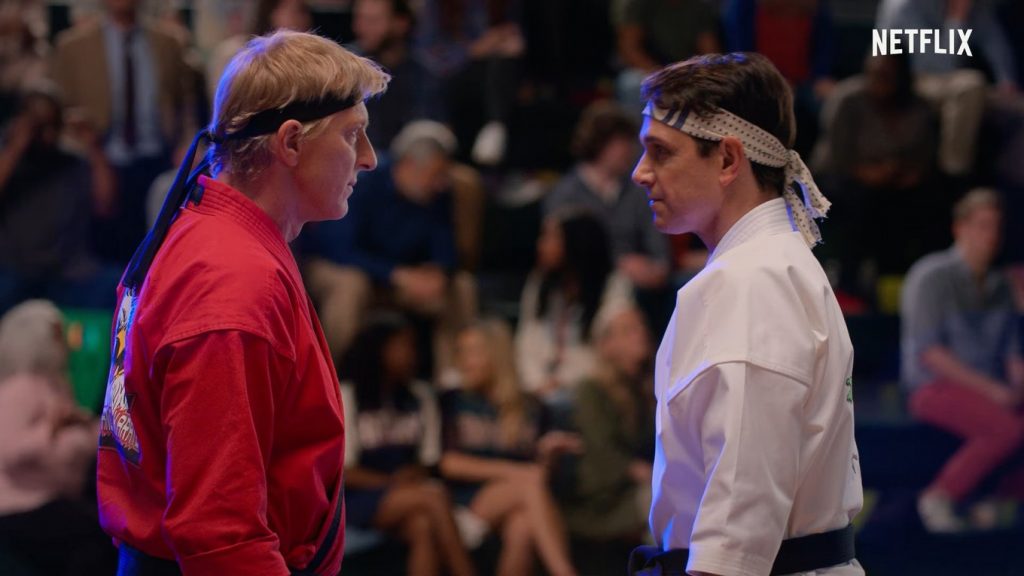
To conclude, if you have read everything you deserve a medal because we have discussed about hard topics which can be boring. Anyway, regarding the 4th season of Cobra Kai and generally the series, we like it. As we have seen in this article, it is full of interesting themes which are handled in a profound and at the same time light way. The series can mix old elements with new ones.
The reference to the past trilogy of Karate Kid are nostalgic and it’s beautiful to see old faces like those of Sensei Kreese, played by Martin Kove , and recently Sensei Terry Silver, played by Thomas Ian Gruffith. Besides them, we have also seen Elisabeth Shue and Tamlyn Tomita who have reprised their roles of respectively Ali Mills and Kumiko.
Moreover, it’s interesting the evolution of the relationship between Johnny and Daniel. Everything started in the films and then evolved into the series, from rivals they become almost partners and we will probably see their real partnership in the next season.
We have seen that the two sensei are very stubborn. They are different but above all similar. Both of them do not want to be weak and they defend strongly their ideas. As we have said, they are the Ying and Yang of one another; they are two opposite parts of the same being.
Daniel has the same hurricane of mixed emotions of Johnny but while the first one tries to control it, the other one tries to channel and use it. We see it when Daniel breaks his son’s tablet during an argument. He is furious, we have never seen him like this before.
Likewise, under the mask a troublesome and reckless man, Johnny is scared, terrified to not be enough, to not be a good son, a good fighter, a good husband and father.
It’s also interesting to notice that while the relationship between Daniel and Johnny improves, Kreese and Silver’s one instead gets worse. the differences between the first two take them to come closer while the differences between the second two take them to separate. After all, what does the opposite law of attraction say?
In short, Cobra Kai is good show with deep interesting themes. It has some flaws but we can skip them thanks the story that is balanced and continues where it stopped with the films and adding always new characters and situations.

